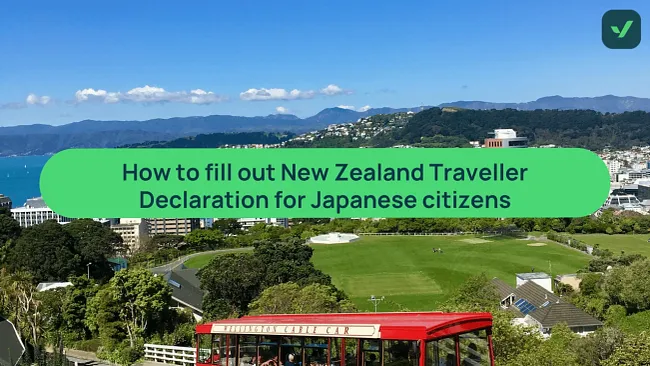
New Zealand Visa: Entry requirements and travel information for New Zealand
Welcome to New Zealand
Wondering if you need a visa for New Zealand? We'll help you figure out if you do, what kind you need, and how to apply. Let's sort out the formalities so you can concentrate on planning your adventure.

What’s a New Zealand Visitor Visa and who’s it for?
Who’s the New Zealand Visitor Visa for?
Visitors traveling on passports from countries not part of New Zealand’s visa waiver program. This includes India, China, Indonesia, Pakistan, Nigeria, Egypt, South Africa, Kazakhstan, Solomon Islands, and more. Use our iVisa Checker Tool to find out your eligibility.
Who’s not eligible for a New Zealand Visitor Visa?
Individuals from visa-waiver countries typically do not need to apply for a visitor visa. This includes Argentina, Denmark, the Czech Republic, Ireland, Japan, Austria, Bahrain, Norway, Seychelles, Saudi Arabia, and more.
What’s the purpose of the New Zealand Visitor Visa?
-
Tourism and family visits.
-
Short-term study: You can study for up to 3 months in any 12 months.
-
Job interviews.
You can’t work, conduct business, or seek medical treatment with this visa.
How long can you stay with a New Zealand Visitor Visa?
The Visitor Visa is a multiple-entry visa that is limited to a maximum stay of nine months in an 18-month period.
What’s a New Zealand ETA (NZeTA) and who’s it for?
Who’s the New Zealand ETA for?
Citizens of visa-waiver countries traveling to New Zealand for tourism or business. It's also required for Australian permanent residents.
What’s the purpose of the New Zealand ETA?
The NZeTA allows for tourism and short-term business visits. This includes holidaying and attending conferences or meetings, but it does not permit employment in New Zealand.
How long can you stay with a New Zealand ETA?
The NZeTA is valid for 2 years after issued and allows multiple entries. Each visit can last up to three months, or six months for UK citizens.

What are the New Zealand long-term visa options and who are they for?
New Zealand offers several long-term visa options that cover a range of purposes, including study, business, employment, and long-term residency, to meet diverse professional and personal requirements. These are the most common ones:
Study visas: Suitable for international students enrolling in New Zealand schools or educational institutions; usually doesn't permit employment except under certain conditions.
Work visas: For individuals seeking employment in New Zealand, including those with a job offer from a New Zealand employer or specific skills and work experience.
Family visas: For those wanting to join or bring family to New Zealand, typically with conditions based on the family member's status.
Business/Investment visas: For entrepreneurs or investors looking to start a business or invest in New Zealand, contributing to its economy.
Residence visas: Aimed at individuals who wish to live in New Zealand permanently, covering various pathways like a skilled migrant, family reunification, and investment.
Transit visas: Required for those transiting through Auckland International Airport when not traveling to Australia from a visa waiver or transit visa waiver country. This visa allows you to stay in the airport's transit area and includes your partner and dependent children under 19.
We at iVisa currently do not handle the above visa types. For details on applying for them, visit the New Zealand Foreign Affairs and Trade website.
Staying healthy in New Zealand: Here’s what you need to know
New Zealand offers excellent healthcare with both public and private options. Here's what you need to know as a traveler.
Make sure to stay updated on routine vaccines
-
No specific vaccines are required unless you’re coming from a yellow fever-endemic country. If you are, you’ll need to present a vaccination certificate.
-
Keep updated with New Zealand’s COVID-19 requirements, such as quarantine, testing, or vaccine certificates, through your airline or the New Zealand Ministry of Health website.
Medical facilities
-
In urban areas, private hospitals and specialized centers usually offer high-quality healthcare services.
-
New Zealand’s healthcare system is top-notch, especially in major cities like Auckland, Christchurch, and Wellington.
-
Pharmacies are readily available for over-the-counter medicines and advice.
Health insurance
We recommend taking out health insurance before you travel anywhere from any destination.
All the major cities in New Zealand will have private medical care, but it can get expensive. You should choose travel insurance with high medical limits.
Contact your insurance provider before traveling to make sure you have the right level of coverage.
Other things to consider when travel insurance:
-
Trip cancellation, delay, and interruption benefits.
-
Medical expenses and medical evacuation benefits.
-
Lost baggage coverage.

Things to be aware of when visiting New Zealand
Keep an extra eye on the following to keep healthy and safe during your trip to New Zealand:
1. Outdoor activities and adventure tourism: Foreigners have been involved in tragic accidents while doing extreme sports activities. If you’re participating in extreme sports, check that the company is well-established and your insurance covers you.
2. Do your research before going to remote locations: If you plan to visit a remote area, check with the local tourist authorities for advice before you leave. Register with a visitor information center or leave details with family or friends.
3. Natural disasters: Extreme weather and natural disasters like earthquakes, flooding, and volcanic eruptions occur. Monitor any warnings or updates from the National Emergency Management Agency.
Medication for personal use
Follow these tips to bring over-the-counter medicines into New Zealand:
-
Declare all medications: Declaring controlled or prescription medications upon arrival is essential.
-
Original packaging: Always keep medicines in their original containers with prescription labels.
-
Prescription or doctor's letter: Carry a valid prescription or a letter from your doctor explaining the need for each medication.
-
Check for restrictions: Research beforehand to ensure your medications are allowed as some substances are restricted or prohibited. Contact your nearest New Zealand embassy to verify that all of your prescription(s) are legal to bring with you.
-
Quantity matters: Bring only a reasonable quantity of medication aligned with your stay duration to avoid complications.

 Australia ETA Online
Australia ETA Online
 United Kingdom ETA
United Kingdom ETA
 India Tourist eVisa
India Tourist eVisa
 Canada ETA Visa
Canada ETA Visa
 Turkey eVisa
Turkey eVisa
 Egypt eVisa
Egypt eVisa
 Singapore SG Arrival Card
Singapore SG Arrival Card
 Indonesia eVoa Visa
Indonesia eVoa Visa
 Aruba ED Card
Aruba ED Card


